|
Kentucky Beef Quality And Care Assurance Certification Now Available Online

The program enables beef and dairy producers to enhance their product, maximize marketability
and strengthen consumer confidence.
Photo by Matt Barton
LEXINGTON, KY.
Organizers of the Kentucky Beef Quality and Care Assurance program are moving the program online to continue to provide producers with the educational information they need during the COVID-19 pandemic. Organizers usually conduct the program through in-person meetings, but due to the pandemic, they moved the training online.
“Although we really enjoy the interactive nature of this program, going online may give it a broader reach,” said Darrh Bullock, extension professor in the UK Department of Animal and Food Sciences. “Ultimately, we implemented this program with our partners, Kentucky Cattlemen’s Association and Kentucky Beef Network, to raise awareness of practices that ensure proper handling and welfare of cattle, while keeping farmers safe and continuing to supply healthy beef to consumers. Going online during this crisis will allow us to keep doing that.”
The program enables beef and dairy producers to enhance their product, maximize marketability and strengthen consumer confidence.
Bullock said the Kentucky BQCA program takes beef quality assurance practices one step further to provide a holistic program for Kentucky producers, by adding cattle handling and care components to the training models. Educational modules provide the best management practices for handling cattle and providing for their well-being, in addition to training on the core principles of beef quality assurance.
“This online process is similar to how we conduct in-person BQCA training,” said Kevin Laurent, extension specialist for beef production at the UK Research and Education Center in Princeton.
Producers must complete Module A - BQCA Overview, and two of the other modules: B – Genetics and Handling, C – Proper Equipment and Additional Cattle Handling, and/or D – Veterinary Diagnostics Lab. Each module contains a video that participants must watch before completing the corresponding test. Producers must achieve a passing score of at least 85 percent, for each test.
Upon successful completion of the course, participants will receive a BQCA training card. The Kentucky Beef Network will mail cards at the end of each month to county Extension offices, where participants may pick them up. If participants need their certification sooner, they will need to call KBN at 859-278-0899 or email at kbn@kycattle.org. A farm gate sign for those who complete the program may also be purchased for an additional $5 by contacting KBN.
“We realize some farmers may not be able to access the online courses or they may want to wait for the in-person courses to resume,” Bullock said. “If that is the case and they had a valid BQCA number on file as of March 1, their existing BQCA certification will remain active until live trainings are available again.”
Producers can access the online BQCA program by visiting http://afs.ca.uky.edu/beef/irm and clicking “Beef Quality & Care Assurance,” or http://kybeefnetwork.com. The certification costs $5, and participants need to pay the fee online prior to the accessing the course. ∆
|
|